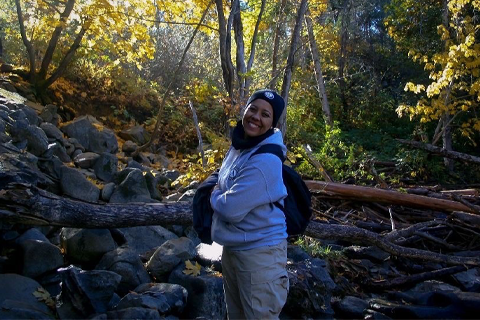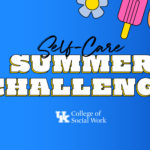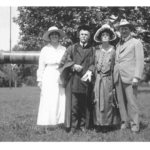Sabri Williams, who graduated from the Bachelor of Arts in Social Work program in May of 2020, is currently working with AmeriCorps in the National Civilian Community Corps (NCCC) program. AmeriCorps NCCC is a full-time service program that covers lodging and travel expenses, allowing young adults to serve on a team and make an impact in communities across the country while gaining valuable leadership skills.
Read her Q&A below to learn more about her and her journey with AmeriCorps.
What made you want to pursue a career in social work?
I always knew that I wanted to help people. Beyond that, I wanted to have a career where I could become, fight for, and witness change in people, communities, and policies.
Why did you choose the University of Kentucky CoSW to purse that career?
I originally chose to attend UK because it was close to home and family, and the most cost efficient with financial aid. As a first generation student, it was important to me to attend college and set an example for my family, but college was still scary and unknown. I began undergrad as a nursing student, but quickly discovered that wasn’t for me. Social work was what I tried next, and loved it! Most of all, I loved the CoSW. It was small and personable; all my professors and classmates knew me and invested in my learning. I got to later grow into a student ambassador and peer mentor, and contribute to the same environment that had first drawn me in. UK CoSW is home.
How did you find out about AmeriCorps?
Some of my practicum supervisors and mentors were AmeriCorps alums, and suggested I look into becoming a member. I was interested in completing a service year, so I took their advice and began looking at job openings in the program.
What made you want to join AmeriCorps?
I graduated in May, almost a year ago, and at that time I knew I wasn’t ready for graduate school, especially as many programs were still adapting to COVID-19. I wanted to gain more social service experience, travel, and explore my passions. Additionally, I wanted to expand my idea of what service encompasses – what it could be, what it looks like, who it can help, how to help, etc. AmeriCorps National Civilian Community Corps (NCCC) provided me with an opportunity to do just that
What do you do at AmeriCorps?
I serve with an AmeriCorps program called the National Civilian Community Corps (NCCC). Typically, NCCC teams are comprised of 7-12 members, aged 18-26 years old. Teams travel the United States working on projects that include urban and rural development, environmental stewardship, natural and other disasters, infrastructure improvement, and energy conservation. My team is comprised of 8 members, and we are working throughout the pacific region. We will have 3 total project rounds during our service term (October to July). I am in the middle of my second project round, in Longview, Washington. We focus on housing construction, winterizing homes for elderly individuals or low-income families, commodity packing and drives, and Meals on Wheels food deliveries. My first project round was in Groveland, California and we focused on disaster recovery and mitigation. We spent most of our time building and maintaining trails, clearing invasive species, increasing defensible land, moving debris and snags, and building fire lines. The work is diverse and changes round to round!
Additionally, all corps members are required to complete volunteer hours that are independent from our service. We can obtain hours at any non-profit agency, doing short-term forms of service. We have been able to participate in a variety of online opportunities. Lastly, within our team we have opportunities for leadership and specialty roles. These include Assistant Team Leader, Service-Learning Initiator, Life After AmeriCorp Representative, Recruiter, Health and Wellness Coordinator, Media Representative, and Vehicle/Tools/Safety Coordinator. I serve as the Life After AmeriCorps representative where I help my teammates with resume building, goal setting, developing professional strengths and skills, and anything else related to their plans following the service term.
What is the most rewarding thing about your work?
The people and communities I work with has been the most rewarding part of AmeriCorps. I cherish the relationships I have built with my teammates, supervisors, and the people we serve. I love that I have had the opportunity to partner with community members, and work alongside a team to effect change. A great example of this happened a few weeks ago when my team and I were doing winterizing on an elderly couple’s home.
The couple qualified for a housing program through the Community Action Plan where my team and I are currently serving. The couple was so grateful for our work and couldn’t express their gratitude enough. They even invited out the local newspaper to do a story because they were so impressed! Upon completing the work, and seeing how much it meant to them, I remember thinking that their reaction alone was enough to fuel me to this work. I don’t know if I can change the whole world, but I can change an individual’s world and that makes all the difference.
What has it been like working with AmeriCorps during the pandemic?
In AmeriCorps, the safety of our team, our partnering agencies, and the community members is always a priority. My teammates and I live together, in a bubble, to simulate a family unit. We follow all the CDC guidelines including wearing cloth or N-95 masks, using gloves, using hand sanitizer and sanitizing surfaces, maintaining social distancing, avoiding public outings or large crowds, taking daily temperature and COVID-19 screening, and protocols on quarantining. Additionally, when we all arrived to campus we were isolated and tested multiple times to ensure clearance before departing to any project location.
Like the rest of society, AmeriCorps has been impacted and is adapting to the pandemic. For example, each corps member is required to complete service/volunteer hours that are separate from work. However, due to COVID-19, many of the agencies and service opportunities are now virtual. Fortunately, for AmeriCorps National Civilian Community Corps (NCCC) COVID-19 has not stopped work, but has encouraged precautions and considerations when traveling. Overall, I feel grateful to be doing this work, although I recognize ways the pandemic has changed how our work is done.
What advice do you have for other social work students?
Social Work is a growing, diverse and critical field of work. My advice is to explore and expand! Don’t limit the places a social worker can be, or your idea of the type of work a social worker can do.





